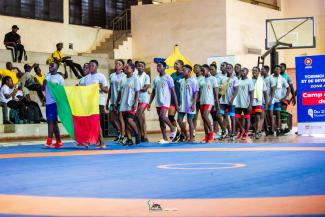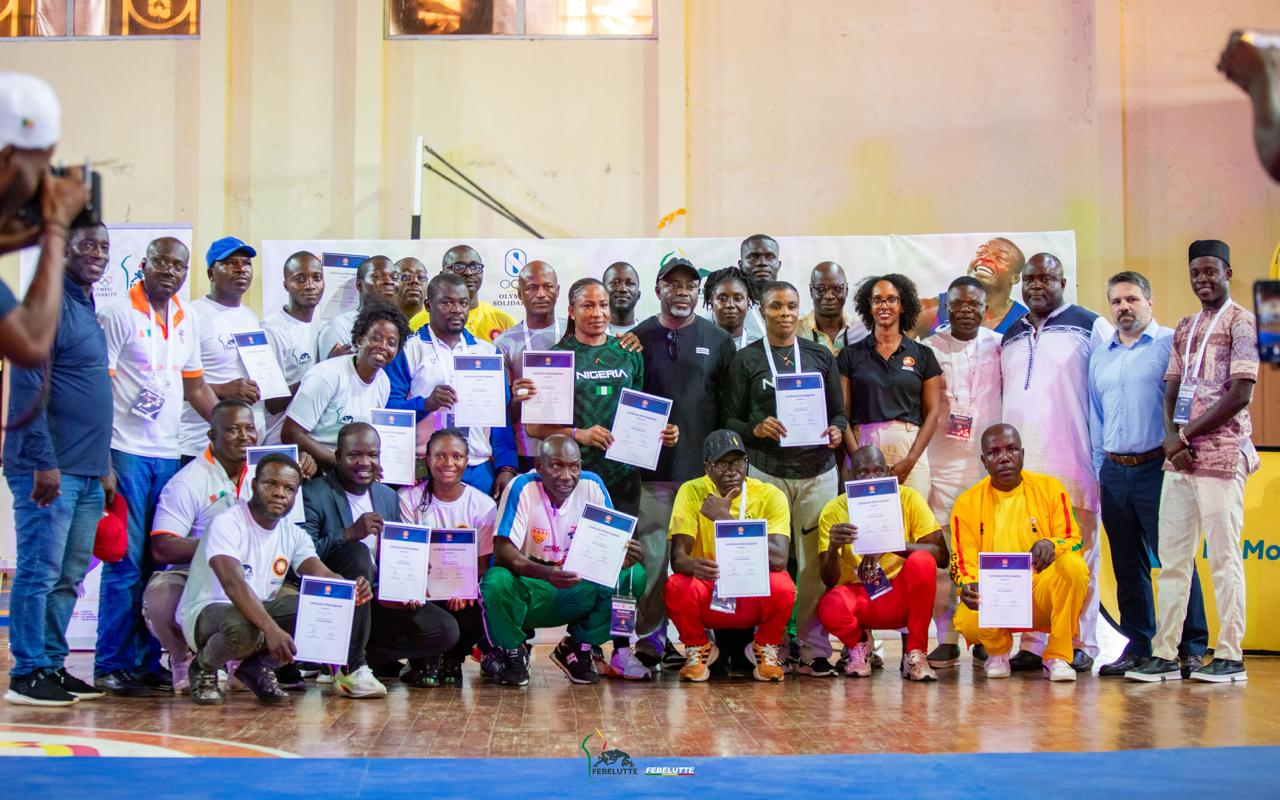Cuba Califica Todas las Categorias en Estilo Grecorromano para los Juegos Olimpicos
Saturday, March 14, 2020 - 00:37 By Taylor GREGORIO

Photo of Gabriel ROSILLO KINDELAN (CUB). By Tony Rotundo.
OTTAWA, Canada – With four Cuban athletes winning their respective semifinals at the Pan American Olympic Qualifier, Cuba has now qualified all six Greco-Roman weights for the 2020 Olympic Games in Tokyo.
In this weekend’s event, the top-two from each weight class will earn a bid for their countries to the 2020 Olympics.
Cuba entered the weekend with the 67 kg and 130 kg weight classes already qualified, thanks to medal-winning performances at the 2019 World Championships in Nur-Sultan, Kazakhstan.
Cubans in the other four weight classes advanced to the Pan Am Olympic Qualifier finals on Friday and punched their tickets to Tokyo. They included Luis ORTA SANCHEZ (60 kg), Yosvanys PENA FLORES (77 kg), Daniel GREGORICH HECHAVARRIA (87 kg) and Gabriel ROSILLO KINDELAN (97 kg).
The unofficial team champions from the 2016 Olympic Games, Cuba seeks to continue its dominance, sending a full squad to Tokyo, including returning Olympic champions Ismael BORRERO MOLINA (67 kg) and Mijain LOPEZ NUNEZ (130 kg).
The United States also had four athletes qualify their weights today, advancing to the finals, including Ildar HAFIZOV (60 kg), Alejandro SANCHO (67 kg), Josef RAU (87 kg) and G’Angelo HANCOCK (97 kg).
Other wrestlers that qualified include Julian HORTA ACEVEDO (COL) at 67 kg, Jose VARGAS RUEDA (MEX) at 77 kg, and Yasmani ACOSTA FERNANDEZ (CHI) and Eduard SOGHOMONYAN (BRA) at 130 kg.
At 67 kg, Horta of Colombia was funded by the United World Wrestling Development Technical Assistance program, which allows athletes from developing countries the opportunities to compete at top-level events. Horta’s qualification for the Olympic Games would not have been possible without the support of UWW.
Not only did Horta qualify for the Olympics but he also went on to win gold at the Pan American Olympic Qualifier, defeating Sancho of USA in the 67 kg finals, 4-0.
The finals featured three head-to-head matches between Cuba and the United States: 60 kg, 87 kg and 97 kg.
Orta of Cuba won his third Pan American gold medal on Friday night, defeating Hafizov of USA in a decisive 7-0 victory in the 60 kg finals.
At 87 kg, Rau picked up his second gold medal of the week as two-time U23 World medalist Gregorich was unable to compete, due to injury.
Rosillo and Hancock battled each other at 97 kg for the third time in less than a week and second time for gold. Hancock won in the finals last week, 10-0, but this time, it was Rosillo taking the gold in an 11-8 shootout, making it one of the most entertaining bouts of the night.
Cuba earned another gold medal at 77 kg as Pena dominated Vargas from Mexico with an 8-0 technical fall.
Claiming the title at 130 kg was 2017 World bronze medalist Acosta of Chile, who overwhelmed Soghomonyan of Brazil with a 9-0 win in the finals.
Action continues tomorrow with the women’s freestyle Pan Am Olympic Qualifier.

Photo of Joe RAU (USA). By Tony Rotundo.
En Espanol
OTTAWA, Canada – Cuatro Cubanos avanzaron a las finales del Clasificatorio Olímpico Panamericano por lo que consiguieron la plaza para los Juegos Olímpicos 2020; por ello, Cuba ha clasificado atletas en las seis categorías del estilo grecorromano para Tokio.
En este evento, los dos mejores atletas de cada categoría calificaron a sus países a la justa Olímpica.
Cuba llego a este evento con las categorías 67 kg y 130 kg ya clasificadas; en las otras cuatro categorías ganaron sus semifinales este viernes para garantizar sus lugares en Tokio. El representativo cubano está conformado por Luis ORTA SANCHEZ (60 kg), Yosvanys PENA FLORES (77 kg), Daniel GREGORICH HECHAVARRIA (87 kg) y Gabriel ROSILLO KINDELAN (97 kg).
El grupo de calificados cubanos se completa con los dos campeones olímpicos, Ismael BORRERO MOLINA (67 kg) y Mijain LOPEZ NUÑEZ (130 kg).
Los Estados Unidos también calificaron cuatro categorías de peso hoy. Los clasificados fueron Ildar HAFIZOV (60 kg), Alejandro SANCHO (67 kg), Josef RAU (87 kg) y G’Angelo HANCOCK (97 kg).
Luchadores de diversos países completan la lista de invitados a Tokio 2020, Julian HORTA ACEVEDO (COL) en 67 kg, Jose VARGAS RUEDA (MEX) en 77 kg, Yasmani ACOSTA FERNANDEZ (CHI) y Eduard SOGHOMONYAN (BRA) en 130 kg.
En 67 kg, Horta de Colombia fue financiado por el programa United World Wrestling Development Technical Assistance, que brinda a los atletas de países en desarrollo la oportunidad de competir en eventos de alto nivel. La clasificación de él no sería posible sin la apoyo de UWW.
Horta no solo se clasificó para los Juegos Olímpicos, sino que también ganó el oro en el Clasificatorio Olímpico Panamericano, derrotando a Sancho de USA en la final de 67 kg, 4-0.
De tres combates en donde Cuba se enfrentó a los Estados Unidos: 60 kg, 87 kg y 97 kg.
Orta de Cuba venció a Sancho de USA, 7-0, para obtener su tercer medalla de oro panamericana.
En 87 kg, Rau gano su segunda medalla de oro de la semana, ya que en la final, el medallista mundial U23 Gregorich, no pudo competir debido a una lesión.
Rosillo y Hancock lucharon en 97 kg por tercer vez en menos de una semana y por segunda vez el oro fue para Hancock, quien gano la semana pasada 10-0, pero esta vez la historia fue diferente y Rosillo derroto a Hancock 11-8, en unos de los combates más emocionante de la noche.
Cuba gano otra medalla de oro en la categoría 77 kg cuando Peña domino a Vargas de México con una victoria contundente de 8-0. Peña también gano el título del Campeonato Panamericano la semana pasada.
El título en los 130 kg fue para el medallista de bronce mundial en 2017, Yasmani Acosta de Chile, quien superó a Soghomonyan de Brasil con una victoria por 9-0.
Acción continua mañana con el estilo libre femenil.
Greco-Roman finals results
60 kg
GOLD - Luis ORTA SANCHEZ (CUB) df. Ildar HAFIZOV (USA), 7-0
BRONZE - Dicther TORO CASTANEDA (COL) df. Gustavo RODRIGUEZ MARTINEZ (VEN), 12-6
BRONZE - Andres MONTANO ARROYO (ECU) df. Samuel GURRIA VIGUERAS (MEX), 9-7
67 kg
GOLD - Julian HORTA ACEVEDO (COL) df. Alejandro SANCHO (USA), 4-0
BRONZE- Joilson DE BRITO RAMOS JUNIOR (BRA) df. Cristhian RIVAS CASTRO (ECU), 9-0
BRONZE- Manuel LOPEZ SALCEDO (MEX) df. Enyer FELICIANO (DOM), fall
77 kg
GOLD - Yosvanys PENA FLORES (CUB) df. Jose VARGAS RUEDA (MEX), 8-0
BRONZE– Patrick SMITH (USA) df. Jair CUERO MUNOZ (COL), 3-2
BRONZE - Marciano ALI (PUR) df. Wuileixis de Jesus RIVAS ESPINOZA (VEN), injury default
87 kg
GOLD - Josef RAU (USA) df. Daniel GREGORICH HECHAVARRIA (CUB), injury default
BRONZE– Ariel ALFONSO RODRIGUEZ (HON) df. Daniel VICENTE GOMEZ (MEX), 6-2
BRONZE- Luis Eduardo AVENDANO ROJAS (VEN) df. Lesyan Osvaldo COUSIN (JAM), 6-1
97 kg
GOLD - Gabriel ROSILLO KINDELAN (CUB) df. G’Angelo HANCOCK (USA), 11-8
BRONZE– Luillys Jose PEREZ MORA (VEN) df. Kevin MEJIA CASTILLO (HON), injury default
130 kg
GOLD - Yasmani ACOSTA FERNANDEZ (CHI) df. Eduard SOGHOMONYAN (BRA), 9-0
BRONZE– Adam COON (USA) df. Leo Dalis SANTANA HEREDIA (DOM), injury default
BRONZE - Moises PEREZ HELLBURG (VEN) df. Luis ROMAN BARRIOS (MEX), 9-0
Greco-Roman semifinal results
60 kg
Ildar HAFIZOV (USA) df. Samuel GURRIA VIGUERAS (MEX), 7-2
Luis ORTA SANCHEZ (CUB) df. Gustavo RODRIGUEZ MARTINEZ (VEN), 5-2
67 kg
Julian HORTA ACEVEDO (COL) df. Joilson DE BRITO RAMOS JUNIOR (BRA), 9-0
Alejandro SANCHO (USA) df. Manuel LOPEZ SALCEDO (MEX), 8-1
77 kg
Jose VARGAS RUEDA (MEX) df. Marciano ALI (PUR), 3-2
Yosvanys PENA FLORES (CUB) df. Patrick SMITH (USA), 6-1
87 kg
Daniel GREGORICH HECHAVARRIA (CUB) df. Ariel ALFONSO RODRIGUEZ (HON), 6-0
Josef RAU (USA) df. Lesyan COUSIN OTOMURO (JAM), 9-1
97 kg
Gabriel ROSILLO KINDELAN (CUB) df. Luillys Jose PEREZ MORA (VEN), 8-0
G’Angelo HANCOCK (USA) df. Kevin MEJIA CASTILLO (HON), 9-0
130 kg
Yasmani ACOSTA FERNANDEZ (CHI) df. Leo SANTANA HEREDIA, 9-0
Eduard SOGHOMONYAN (BRA) df. Moises PEREZ HELLBURG (VEN), fall



Share your thoughts.
Comments